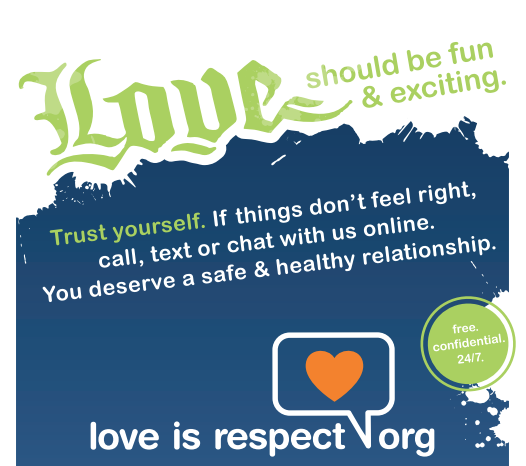By Zoë Fay-Stindt of Literary Women in Action
There are hundreds of ways sexual violence creeps into our everyday: between media and popular culture, the jokes we make with our friends or the general way we carry ourselves in the world, sexual violence has been largely normalized in American society. Contrary to some portrayals in media & culture, sexual relationships come with responsibility – and are only okay when all parties are consenting and having fun.
As a teen, these aspects of normalized sexual violence are often heightened in high school and our social circles – often by people who don’t realize what they’re doing to uphold rape culture. To be a better advocate and combat the normalization of sexual violence and rape culture, there are several things you can do in your own life.
In your own relationships:
- Respect “no” as an answer. End point. If someone says they don’t want to do anything else, or says they’re not into something, don’t try to convince them otherwise, and don’t try it again later. Once they’ve said no, let them be the one to say they feel ready or comfortable to do that thing later—if at all.
- But don’t only rely on “no” as the only boundary. As Love is Respect explains, “no means no” should not be the only yardstick by which we measure our partner’s consent—it puts the responsibility on their shoulders to draw the line, and focuses only on what they don’t want. Also pay attention to your partner’s body language. If they are normally talkative, are they suddenly quiet? Did they freeze up or stop moving? These can be signs that someone isn’t okay with what’s happening, and you can check in.
- Talk about sex before you have it. Make sure you and your partner are on the same page, about boundaries, how to prevent STIs, and pregnancy. Have you been tested for STIs? Do you want to use condoms or another kind of birth control, and is your partner on board? What boundaries do you and your partner have? What words will you use if either of you feel uncomfortable and want to take a break?
- Ask questions when you’re hooking up. Asking things like, “Is this okay?” and “Are you comfortable?” are great ways to not only gauge the situation and your partner’s comfort, but also take part in the conversation on consent yourself.
When interacting with others:
- Speak out against sexist or homophobic jokes and slut-shaming bullying. While they might seem harmless, sexually explicit jokes or calling someone a “slut” play a big role in upholding rape culture’s power. If you don’t speak out, this behavior will worsen. According to the Texas Council on Family Violence, “acceptance of dating abuse among friends is one of the strongest links to future involvement in dating abuse.” When we don’t challenge those who are around us, we tell them what they’re doing is okay, and we become complicit.
- Report it. If calling out your friends doesn’t stop them from cat-calling or making inappropriate jokes—and let’s face it, chances are they’re too worried about seeming cool to take your request in stride—you can take it to someone else. Talk to your school counselor, teacher, family member, or any other adult you trust. Let them know you want to do something about it. If you don’t want to tell someone yet, call the Love is Respect hotline (1-866-331-9474) to talk anonymously first.
- Talk about it. If something made you uncomfortable, share that moment and discomfort with someone and talk through why it made you uncomfortable, and what you could do next time to change the power dynamic.
- Self-reflect. How would those comments have made you feel if they were directed at you? Is there anything about the way you interact with others that you could change to be a better example of respect? Has there ever been a situation in which you pushed someone’s boundaries?
- Distract the situation. If things really get out of hand and you feel a dangerous situation needs your intervention, follow the CARE steps: create a distraction, ask the person in question directly if they need help, refer to an authority, and enlist others to help.
- Remember, not all sexual violence is physical. While some situations might be obviously dangerous or violent, there are a ton of different ways sexual violence manifests itself inside a relationship. If you’re wondering what might be considered as dating violence, check out Love Is Respect’s Power and Control Wheel.
Get involved! There are several organizations you can join to help advocate for healthier dating and happier hooking up for everyone.
- Break the Cycle, a national organization, works to support young people aged 12-24 as they “build healthy relationships and create a culture without abuse.”
- Doing similar work to break down our current social narrative and norms around sexual assault, We Rethink engages with young men and boys, empowering them to become community leaders.
- Other great organizations include Men Stopping Violence and Futures Without Violence, both of which use community organizing and education to stop violence against women, and That’s Not Cool, a national organization dedicated to ending dating violence, and putting the power back in the hands of teens to create healthier relationships.



